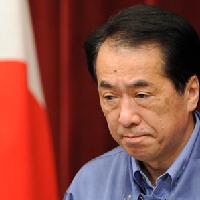
No to national unity on the bosses’ terms
The crisis in Japan since the devastating tsunami has already had major political repercussions. Prior to the earthquake, the Democratic Party government led by Naoto Kan was standing at only 20% in the opinion polls, with the opposition blocking his finance bill and calling for his resignation. It had won over 42% in the August 2009 election. However, the weakness of the economic recovery and a series of scandals as well as retreats on promises made in the election has undermined their support.
Kan has sought to exploit what has been described as Japan’s deepest post-war crisis to strengthen his position. In a relatively rare event the Emperor was brought out to give a speech calling for national unity. Kan has since pushed the idea for a grand coalition, a government of national unity. DPJ counter disaster council head, Shu Watanabe, stated in TBS television that “We proposed to the opposition to form a cabinet for saving this country–this is a way of saying, let’s put aside political differences and put all our efforts into rehabilitation and reconstruction.”
The prime minister has announced that the size of the cabinet will be increased by three to twenty ministers and has asked opposition parties, the Liberal Democratic Party and the Buddhist Komeito in particular to join the government. He even went as far as to call LDP leader Sadakazu Tanigaki to propose the he become vice prime minister, with specific responsibility for reconstruction.
This offer has at least for now been politely rejected by these parties. They have no desire to drink from the poisoned chalice and take responsiblity for the unpopular measures that Kan will be forced to implement due to the economic situation of Japanese capitalism. At least not for a handful of ministries. They have, however, offered to cooperate on passing a finance bill to fund the recovery.
Nevertheless, the ruling class wants a strong government to deal with the crisis and the present Kan government is certainly not a strong government. For this reason the question of the formation a Government of National Unity of all the right wing parties in the near future is not excluded. It is possible that the LDP and Komeito will eventually agree to join the government maybe for a greater share of ministries.
To its left the Japanese Communist Party (which got 7% in the 2009 election) would almost certainly be excluded from such a government. It is not clear whether the small Social Democratic Party (4.2% in 2009), which recently quit the coalition with Kan’s Democratic Party over the issue of US bases in Okinawa, would be enticed into rejoining. While it might inscribe national unity on its banner, such a government would be a government of reaction whose aim would be to fight a one-sided class war, placing the burden of the crisis on the backs of the workers and the poor. This is indicated in a speech made to reporters by DPJ general secretary on March 15th, “We must secure funds to deal with this massive disaster. We have to decisively review spending plans including campaign promises such as childcare handouts and toll-free highways.”
While such a government might have a crushing majority in the Diet (parliament), and initially overwhelming support in the country, its policies would face resistance from the workers and the poor. It is out of that resistance to attacks on living standards that the possibility will arise for a new workers’ party to be built. We stand not for national unity of the parties of big business but the unity of workers and poor people behind a fighting socialist alternative.
The only way to take the running of the country out of the hands of the big monopolies, and all the parties who represent them and dupe the people, is to replace them with a workers’ government. In order to plan the best and safest distribution of production, distribution, services and resources is to take into public ownership the main industries and the banks, under democratic workers’ control and management.
End capitalist lies and chaos!
No to a bosses’ government of national unity.
For a new workers’ party with a programme of fundamental socialist change!

Be the first to comment